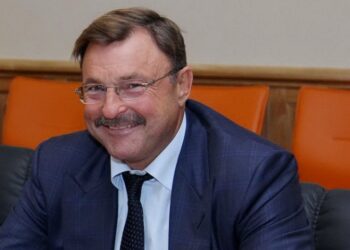The combined structure of the PFR and the FSS can be headed by Tatyana Golikova, while her post of deputy prime minister can be received by the deputy mayor of Moscow, Anastasia Rakova. Who will be in the black – Mikhail Mishustin or Sergei Sobyanin?
In the near future, high-profile reshuffles in the Government of the Russian Federation may be announced, which should result in a hardware strengthening of both the current Prime Minister Mikhail Mishustin and his, as it is believed, the main opponent, the mayor of Moscow Sergei Sobyanin.
According to sources The Moscow Postthis can happen due to the appointment of the head of the joint Social Fund (created on the basis of Social Insurance and the Pension Fund) of the current “social” Deputy Prime Minister Tatyana Golikova.
According to the source, the most likely replacement for Golikova in the government could be the “social” vice-mayor of Moscow, Anastasia Rakova, who is believed to be an official close to Sergei Sobyanin.
Note that the Government has not yet confirmed this information. And those channels through which this insider passed, sharply cleaned up their publications. That is, it seems that the issue has not yet been finally resolved.
Kigim did the job
The recent resignation from his post of the head of the Pension Fund of Russia, Andrei Kigim, also prompted thoughts about imminent reshuffles. As recently as yesterday, July 31, Mr. Kigim resigned before the upcoming merger of the PFR and the Social Insurance Fund (FSS). Deputy Chairman of the Board of the Fund Sergey Chirkov, who has been working in the PFR since 2001, has been appointed acting
FSS Kigim led before his appointment to the FIU. Recall that at that time one of the most scandalous, inefficient and corrupt structures of our country. Moreover, Kigim came there at the explicit suggestion of Mikhail Mishustin and with quite understandable goals. The first was to prepare the FIU for a merger with the FSS. These plans were discussed initially.
The second, latent, is the clearing of the Augean stables, which, in terms of corruption, has long been the FIU. After all, the arrival of Kigim was preceded by a whole series of corruption scandals, as a result of which the reputation of Kigim’s predecessor, Anton Drozdov, suffered significantly.
After Drozdov, the former head of the Ministry of Labor Maxim Topilin, who is believed to be Golikova’s man, was in charge of the PFR for a short time. Its task is also called preparation for rapprochement with the Social Insurance Fund, especially in terms of standardization and workflow.
Anton Drozdov was relieved of his post in January 2020. At the same time, until February 5, 2021, Drozdov remained Deputy Minister of Finance of the Russian Federation. After that, he was made redundant. According to evil tongues, allegedly for a strong corruption trail that has been trailing him since the FIU.
But Drozdov himself was never accused of crimes. But his former right hand, the ex-deputy head of the FIU Alexei Ivanov, was under investigation for corruption, wrote about this RIA News”. Later they said that Drozdov could have been given an ultimatum: you can leave calmly, or you go to testify along with Ivanov.
Kigim at the head of the FIU was also a very controversial figure. Prior to the FSS, he headed the All-Russian Union of Insurers, a rather opaque and problematic structure. Insurance market experts claim that allegedly in 2013 there was a question about the legitimacy of Kigim at the head of the All-Russian Union of Insurers. As if it came to openly raising the issue of his resignation and even the creation of parallel organizations.
The approval and departure of Kigim is expedient if you look at his figure as a temporary kamikaze manager who was supposed to sort out the legacy of Drozdov-Topilin and clear the way for the head of the already united structure.
There is also a more prosaic version of Kigim’s departure. The latter became the object of harsh criticism from the State Duma deputies for the construction of the so-called. “palaces” of the PFR with the money of pensioners. Of course, we are talking about the artsy buildings of the PFR departments worth hundreds of millions of rubles that have set the teeth on edge. How much they need the fund against the backdrop of modest average pensions in the country – let everyone decide for himself.

Andrey Kigim, Mishustin’s obvious protégé, made no secret of the fact that he is a temporary figure and has the task of preparing the PFR for a merger with the FSS. Photo: Vladimir Fedorenko / RIA Novosti
A loud scandal erupted during Andrey Kigim’s speech in the State Duma in October 2021. The official did not answer the questions put by the deputies, and advised the parliamentarians to “calm down.” Wrote about it “Gazeta.ru”.
Two days later, deputy Sergei Mironov suggested that Kigim calm down himself, and at the same time resign. In addition, it was Mironov who called for the liquidation of the PFR and the MHIF, to unite them into a single structure subordinate to the Government.
This, in fact, is happening, with the difference that instead of the MHIF, the PFR is merged with the FSS. Well, Kigim, “daring” to the deputies, is understandable – apparently, he knew perfectly well that he had several months left to work as head of the FIU.
Let’s do without FOMS
The united structure will have colossal administrative and financial resources, which will be under the control of the head of the Government, Mishustin. The mere fact that PFR assets of 9.5 trillion rubles are comparable to the federal budget speaks volumes.
Earlier it was assumed that the Compulsory Medical Insurance Fund would also be included in the structure. Since 2020, it has been led by Yelenya Chernyakova – she worked with Mishustin through the Federal Tax Service, she is well acquainted with the Prime Minister. However, apparently, Mishustin FOMS lost in the hardware struggle – in April 2022, it was headed by a completely different person, Ilya Balanin.
There is a version that he could be “pushed” to the post of head of the MHIF by Moscow Mayor Sergei Sobyanin, who is believed to be Mikhail Mishustin’s main opponent for control of government structures. Like, Sobyanin has good relations with the former head of the Yaroslavl region Dmitry Mironov, in whose team Balanin worked earlier.
By the way, it was Tatyana Golikova who was very worried about the inclusion of the MHIF into the new structure. In the rank of Deputy Prime Minister, she oversaw all three departments – the PFR, the Compulsory Medical Insurance Fund, and the FSS.

It seems that Golikova has been preparing to lead the united structure since 2017 – she became one of the initiators of the association. Photo: 27r.ru
She made a proposal to merge back in 2017. In 2018, she also announced a change in the organizational legal form (status) of state non-budgetary funds. At that time, Veronika Skvortsova, the head of the Ministry of Health of the Russian Federation, did not support the unification of the three funds, calling the idea “absolute populism.”
This is for someone to see. From the point of view of efficiency of work – it can be a profanity. But from the point of view of the concentration of social administrative levers under the control of one person loyal to Mishustin, it is very effective.
Mishustin vs. Sobyanin
Looking at the situation as a whole, we recall that both Mikhail Mishustin and Moscow Mayor Sergei Sobyanin have long been credited with almost presidential ambitions. So far, they have clearly not shown them in any way – especially now, when the whole country has rallied against the backdrop of a special military operation to protect Donbass.
However, back in 2020, against the backdrop of the appointment of a new government, there was talk that Sergei Sobyanin wanted to take Mishustin’s place with an eye to a possible presidency. And then there was a pandemic, during which both officials actually competed – who will most effectively solve the tasks assigned to the country to combat the infection.
Here, Mikhail Mishustin won with a serious advantage. The government has proposed a package of measures to support the population and businesses, deftly playing on the social agenda. At the same time, Sobyanin had problems – this was the notorious “lockdown”, and failures in the operation of the Social Monitoring application (for which, we recall, as much as 200 million rubles were spent), the general dissatisfaction of Muscovites with strict restrictions.
As for the Government, even then The Moscow Post assumedthat compensation for Sergei Sobyanin, who flew past the chair of the head of the Cabinet, will be several serious ministerial portfolios. One of these is the position of the head of the Ministry of Economic Development, who is the former deputy of Sobyanin and his protege, the former head of the Kama region Maxim Reshetnikov.
For Tatyana Golikova, as Deputy Prime Minister, the appointment of the head of the united structure will, in fact, be a demotion. However, in reality it will receive even more financial and administrative resources.
They have long been trying to attribute Golikova herself to the lobbying of large pharmaceutical companies, primarily Pharmstandard. Today, the amount of government contracts received by Pharmstandard is inexorably approaching half a trillion rubles. Of these, 190 billion are with the Ministry of Health, which, in the rank of Deputy Prime Minister, is supervised by Tatyana Golikova.
As for the second part of the inside, the possible appointment of Anastasia Rakova, Deputy Mayor of Moscow, as a social vice-premier. This would be extremely beneficial for Sergei Sobyanin – after all, according to the results of the 2020 arrangement, he did not have his own deputy prime ministers surrounded by Mishustin.

Mikhail Mishustin and Sergei Sobyanin continue the fight for influence in the Cabinet? Photo: realtribune.ru
Thus, Rakova, like Maxim Reshetnikov, from Sobyanin’s deputy can become one of the key figures in the Government, which will balance the interests of Mishustin and Golikova. In turn, the latter will have a real leviathan in their hands with multi-trillion dollar budgets and direct influence on social processes in the country.










